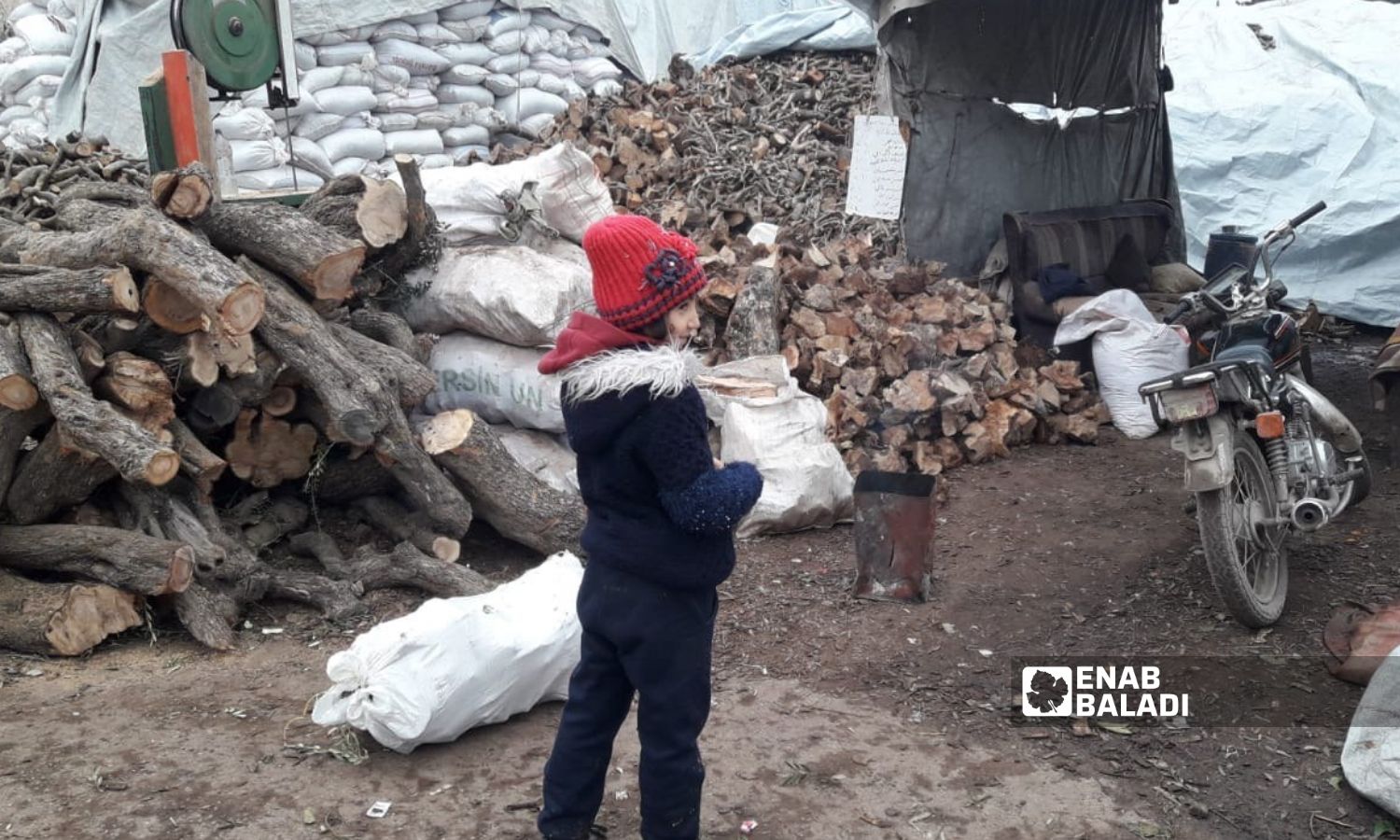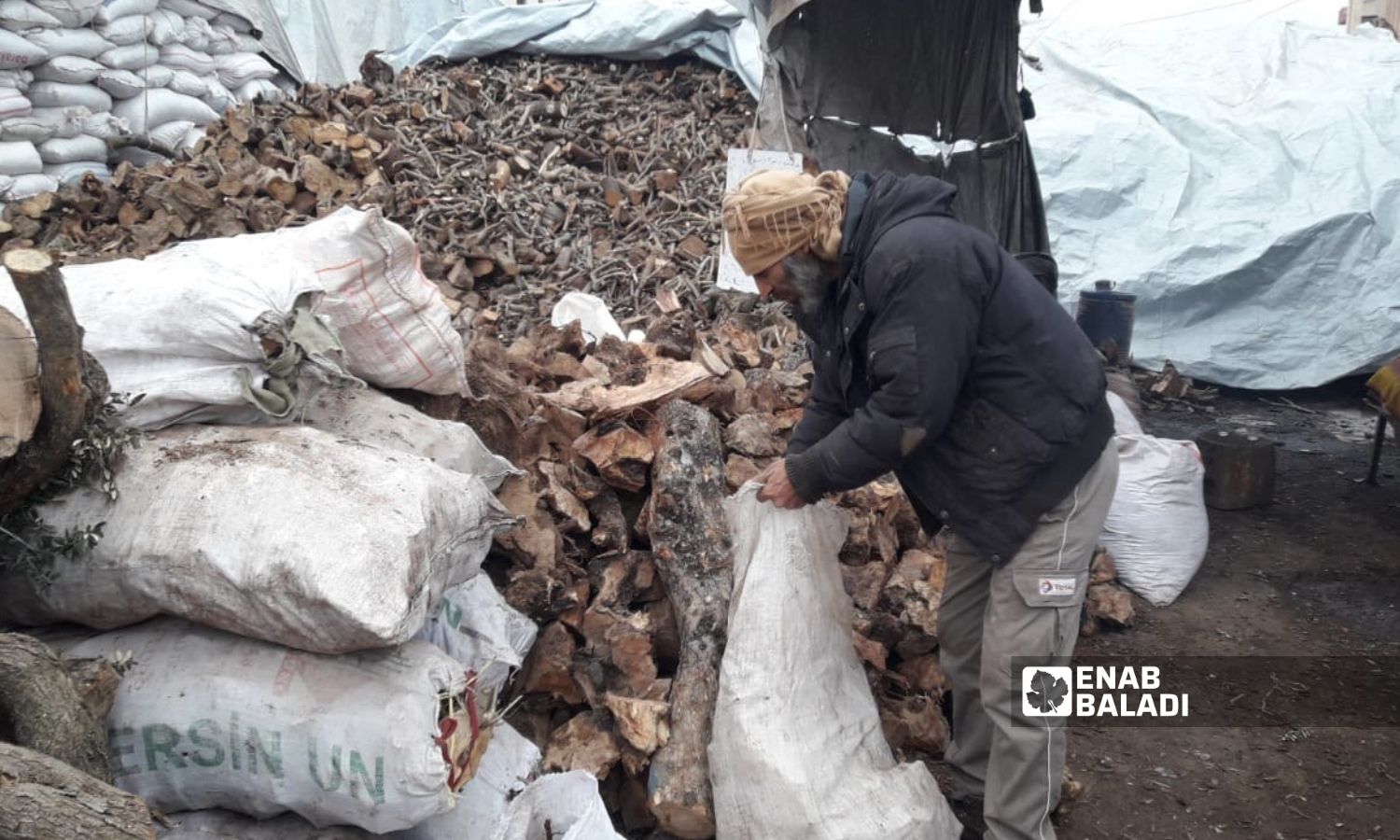



Enab Baladi – Anas al-Khouli
“I was close to losing them; my two children had a fever, severe shortness of breath, chest pain, and a bad cough,” the 32-year-old Mohammad al-Mohammad describes the pain he had been through last year.
“It was a nightmare,” he told Enab Baladi. Such suffering is a part of the winter tragedy for dozens of families who are forced to light various types of materials in search of warmth.
Al-Mohammad said that the thick smoke and toxic gases emitted from the fireplace due to the ignition of unusable materials, such as coal and plastic garbage, could have suffocated his two daughters, but urgent medical intervention saved their lives.
Over the past years, families in the northern Idlib region have been forced to use charcoal or poor types of firewood, cardboard, nylon, and other materials that cause many problems.
Finding a safe way to keep warm is the biggest challenge that families face every winter, including the family of Omar al-Bardimi, 41, a day laborer who is still unable to find a way to heat his tent this winter.
Fuel prices have doubled this year compared to the previous year, and most families will not be able to secure fuel, al-Bardimi said as a worker whose wage is about 60 Turkish liras per day will not be able to buy fuel, nor will he be able to save 25 Turkish liras to buy five kilograms of firewood needed for heating.
Al-Bardimi believes that the residents resort to what they do every year, despite the dangers of that, referring to burning old clothes, shoes, and plastic materials.
While searching for alternatives to fuel and trying to heat their tents and homes, people may face several problems, most notably cases of suffocation due to toxic gases, in addition to the burning of tents.

A man collects firewood for heating in one of the Idlib camps – 9 December 2022 (Enab Baladi / Anas al-Khouli)
The Idlib-based doctor Moataz al-Bakour told Enab Baladi that inhaling toxic gases resulting from burning materials that are not suitable for heating leads to chronic brain damage and possibly death.
The doctor advises to adjust the heating devices and to ensure that smoke does not leak into the house during the combustion process and that the house chimneys are permanently valid.
Al-Bakour also recommended making sure that the material combustion process is completely finished before going to sleep and turning off the heater to avoid cases of fire in the house and camps while sleeping and to avoid cases of suffocation.
Amid the inability of families to secure most of the materials used for heating, some resort to using coal because of its low price compared to other materials.
Although coal produces a lot of heat that provides the required heating for families, its use has many health effects.
The general physician residing in Idlib, Jihad al-Zoubi, told Enab Baladi that suffocation is one of the main harms of inhaling coal smoke, as it contains a number of dangerous chemicals, such as arsenic, carbon monoxide, and lead.
The burning of coal produces small particles of harmful titanium that can close the airway and, in many cases, cause death.
Inhaling coal also causes cardiovascular diseases, in addition to irritation of the eyes, nose, and throat, according to what the doctor said, warning against using coal for heating in homes.
He recommended reviewing medical centers as soon as they feel respiratory problems, especially in children, in order to carry out the necessary medical interventions in a timely manner.
The prices of heating materials in Idlib have continued to rise since the beginning of the winter season, prompting some able-bodied families to reduce the quantities they buy in preparation for winter, while others continue to search for solutions and alternatives, according to what was monitored by Enab Baladi.
The firewood merchant Abdullah al-Halabi, 54, told Enab Baladi that the high prices of heating materials prompted the people to use the available heating materials, ignoring the health consequences of that.
The prices of firewood range between 200 and 250 US dollars per ton, according to the degree of dryness and quality, while last year, the prices ranged between 120 and 150 dollars.
Many people resort to using husks, such as hazelnut and pistachio husks, for heating, but their prices have increased to approach the price of firewood, as the price of a ton of pistachio husks reached 315 US dollars, compared to 200 dollars last year, and the price of a heater for the husks is about 200 dollars.
The value of the lira against $1 is 16.63 Turkish liras, according to the Döviz website, which specializes in exchange rates and currencies.
People of northern Syria suffer from a gap between their income and the prices of heating materials, as the number of people who need humanitarian assistance in northwestern Syria is estimated at 2.7 million out of a total population of about four million, according to reports by the United Nations High Commissioner for Refugees (UNHCR).
More than 92% of families in northwestern Syria are unable to secure heating materials for the coming winter, adding that 78% of families did not receive heating supplies, specifically within camps over the past year, the Syrian Response Coordination Group (SRCG) team said on 13 September.
if you think the article contain wrong information or you have additional details Send Correction